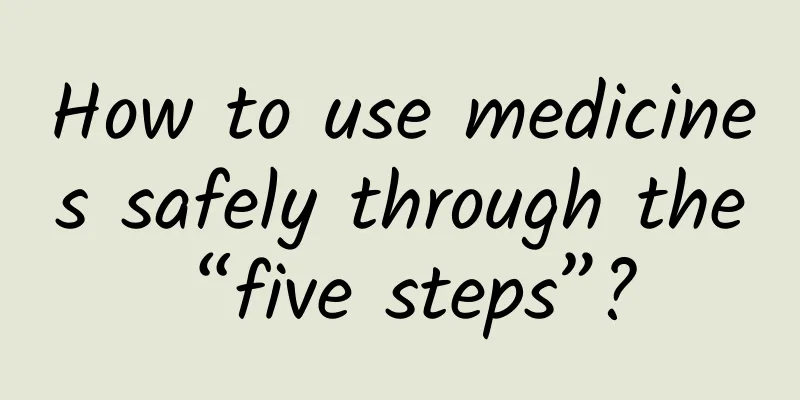How to use medicines safely through the “five steps”?

|
Author: Zhao Zhigang, Chief Pharmacist, Beijing Tiantan Hospital, Capital Medical University Reviewer: Liu Zhi, Chief Physician, Xuanwu Hospital, Capital Medical University As we all know, medicine is three-part poison. While it can cure diseases, it certainly has certain side effects or adverse reactions. Therefore, medicine should not be taken carelessly. So how can we take medicine more safely? We can achieve the goal of safe medication through five parts, namely the "five steps". 1. Safe use of medicines Part 1 When seeing a doctor, explain your condition clearly to the doctor, including your symptoms, any complications, underlying diseases, what medicines you are taking, etc. Figure 1 Original copyright image, no permission to reprint For example, some drugs can cause great irritation and damage to the stomach after taking them, so patients with underlying diseases such as gastric ulcers should pay special attention. Some drugs have many dosage forms, such as capsules, which may reduce the damage to the stomach. Some drugs are made into enteric-coated tablets, which do not dissolve in the stomach because the pH value of the stomach is very low. Enteric-coated tablets will not be released in the environment of gastric acid. They will only be released when the pH value in the intestine rises and becomes alkaline. Releasing and absorbing at the same time can also reduce irritation to the stomach. Of course, strong acidic and alkaline drugs are irritating to the stomach, so scientists are also studying various methods to avoid or reduce the damage caused by some drugs to the gastrointestinal tract. For patients, it is very important to tell the doctor and pharmacist when seeing a doctor: How is your gastrointestinal function? Do you have ulcers? Do you have bleeding? Telling the doctor and pharmacist this information will help them provide more targeted treatment guidance. In addition, if you feel stomach discomfort after taking medicine, you must also tell the doctor or pharmacist, and then take targeted measures. 2. Safe Use of Medication Part 2 Before taking medicine, be sure to ask the pharmacist whether you should take it before or after a meal. Figure 2 Original copyright image, no permission to reprint For example, acarbose is an oral medication commonly used by diabetic patients. Because it lowers blood sugar after meals, when taking this medicine, you are required to start taking it after the first bite of food, and it must be chewed rather than swallowed. It can only be chewed up and taken to achieve the best effect. Of course, some medicines require to be taken after meals, because they are very irritating to the gastrointestinal tract. Taking the medicine after food enters the stomach can reduce irritation to the stomach. Some medicines must be taken before bedtime, such as lipid-regulating drugs, because the peak of blood lipid secretion is at night, and taking them before bedtime can just cover the peak of blood lipids. There is another time to take medicine, which is called taking it with meals. That is, taking it when eating. Many hypoglycemic drugs are taken with meals. There is another time to take medicine called three times a day. What does three times a day mean? Take it once every eight hours. Normal people eat three meals a day, so can I take it with meals? There are less than eight hours between the three meals, so three times a day does not mean taking it with meals. Many people also say that doctors and pharmacists will tell you that the medicine should be taken on an empty stomach, but ordinary people don't know what an empty stomach means. In fact, an empty stomach means one hour before a meal, or two hours after a meal. Some people say that an empty stomach means taking medicine before a meal, which is wrong. An hour before a meal is an empty stomach, but half an hour before a meal is not an empty stomach. 3. Safe Use of Medication Part 3 Part 3: How to store medicine after you get home is also very important. Some medicines need to be refrigerated, some need to be stored in a cool place, and most medicines need to be stored at room temperature. Figure 3 Original copyright image, no permission to reprint Some medicines that need to be stored in the refrigerator need to be refrigerated (2-8℃) and some need to be frozen (below 0℃). These two are different. Most of them are stored in the refrigerator. You cannot put refrigerated medicines in the freezer, and you cannot put frozen medicines in the refrigerator. For example, many probiotics are medicines that need to be refrigerated. Probiotics mainly refer to intestinal probiotics, which is a general term for the beneficial bacteria in the intestine. Adding foreign bacteria that are beneficial to the human body from outside the body can help increase the number of one or several probiotics in the intestine, help regulate the balance of intestinal flora, and thus prevent and treat diseases. 4. Safe Use of Medication Part 4 Medicines should be kept out of reach of children. If there are children at home, medicines should be stored in a special locked storage box and placed out of reach of children. Children, especially those aged 3-4, often imitate their parents, grandparents, and grandparents in taking medicine, which may lead to children taking the medicine by mistake. Figure 4 Original copyright image, no permission to reprint There is a drug called fentanyl patch, which is a painkiller for advanced cancer patients. One patch can last for three days, and after three days, a small amount of drug ingredients will remain in the patch. If grandparents throw the patch away after applying it, and children think it is fun and pick it up and apply it on themselves, this imitative behavior may cause poisoning or even death to the child. In addition, medicines must be stored in their original packaging, not in beverage bottles, candy boxes, or food packaging bags, to prevent children from mistaking them for food or candy, leading to accidental ingestion and unnecessary consequences. Special attention should be paid to the storage of medicines, especially if there are children at home or grandparents with children visiting the house. 5. Safe Use of Medication Part 5 Part Five: If you feel any discomfort during the use of medicines, you should communicate with medical staff in time, because there are many diseases and drug-induced diseases that are difficult to distinguish, and ordinary people cannot judge by themselves, so go to the hospital in time and communicate with medical staff. Figure 5 Original copyright image, no permission to reprint For example, hormone drugs can increase blood pressure and need to be differentiated from primary hypertension. For example, some anti-tumor drugs, especially anthracyclines, can cause cardiomyopathy, which needs to be differentiated from primary myocardial disease. For example, the kidney is one of the important organs for drug elimination in the body. Many types of drugs are excreted through the kidney, so the kidney is easily damaged by drugs. Once damage occurs, it is necessary to distinguish it from primary kidney disease. |
<<: If your child keeps coughing, be careful it may be rhinitis!
Recommend
Many domestic and foreign media reported the first case of H3N8 avian influenza
Yesterday, the International Department of the Ch...
Why do I feel chest tightness when I'm pregnant?
Chest tightness is a subjective feeling of a pers...
Can I eat Amaranth during my period?
As a woman, there will be a few days every month ...
Do women feel pain during miscarriage?
There are many methods of abortion. In addition t...
Level 10 pain! Is “snake around waist” the residual virus of chickenpox?
Let me ask you a question first. Have you ever he...
Precautions for pregnancy postures
Assisted pregnancy is a complicated process and t...
Seven reasons why you should not have a second child
With the introduction of the two-child policy, ma...
Leukocytic leukocyte esterase 20
Routine examination of leucorrhea can timely deal...
Wrinkled woman pictures
Girls with these 4 habits will definitely have wr...
How to eat to treat high blood pressure
For more dietary recommendations, please refer to...
How to treat frequent urination in women and what medicine to take
Frequent urination is a disease in most cases, wh...
Hard abdomen after cesarean section
Although cesarean section has become a very conve...
Labia minora cauliflower-shaped
The cauliflower-like spots that appear on the lab...
Causes of heavy menstrual flow and blood clots
Many female friends always encounter various prob...









